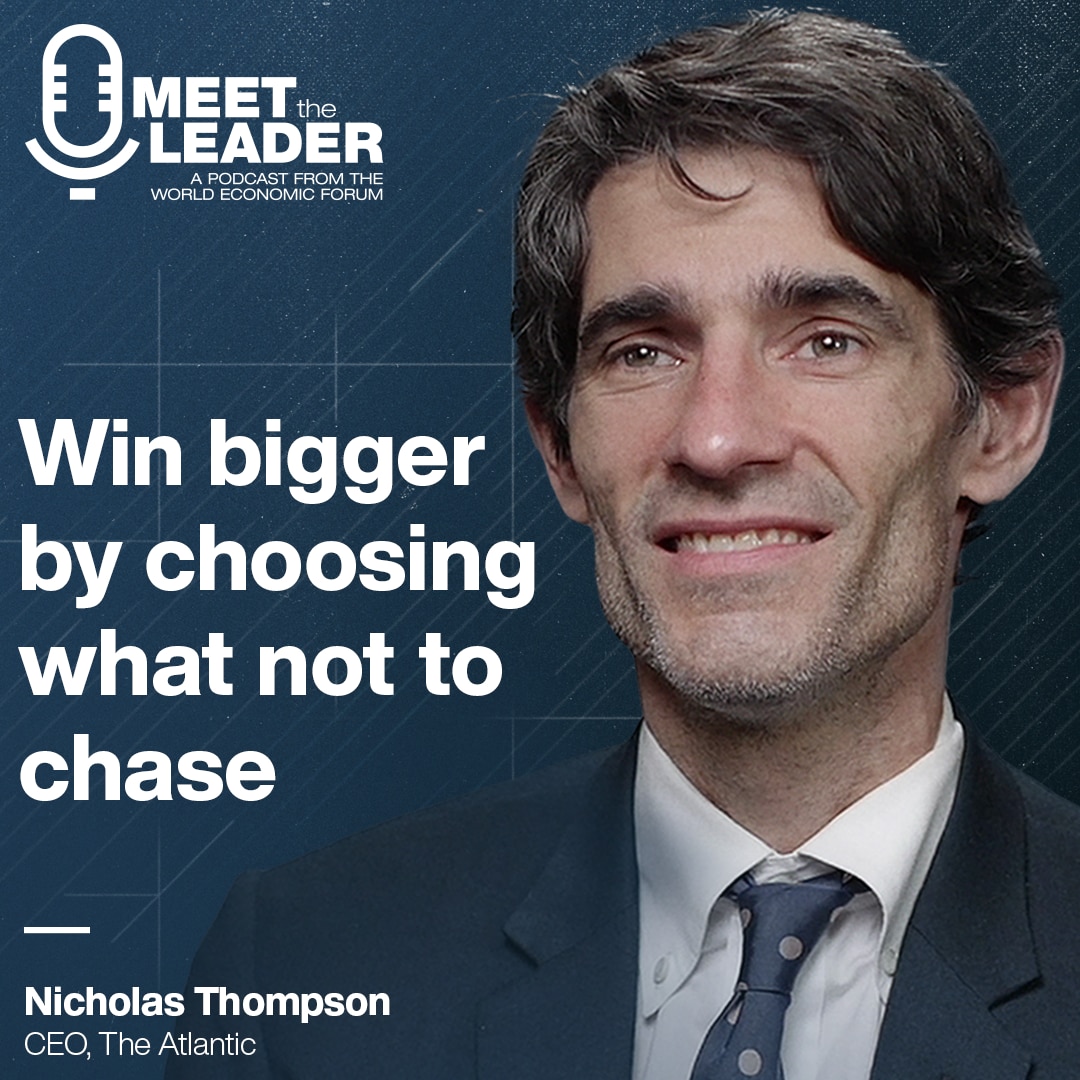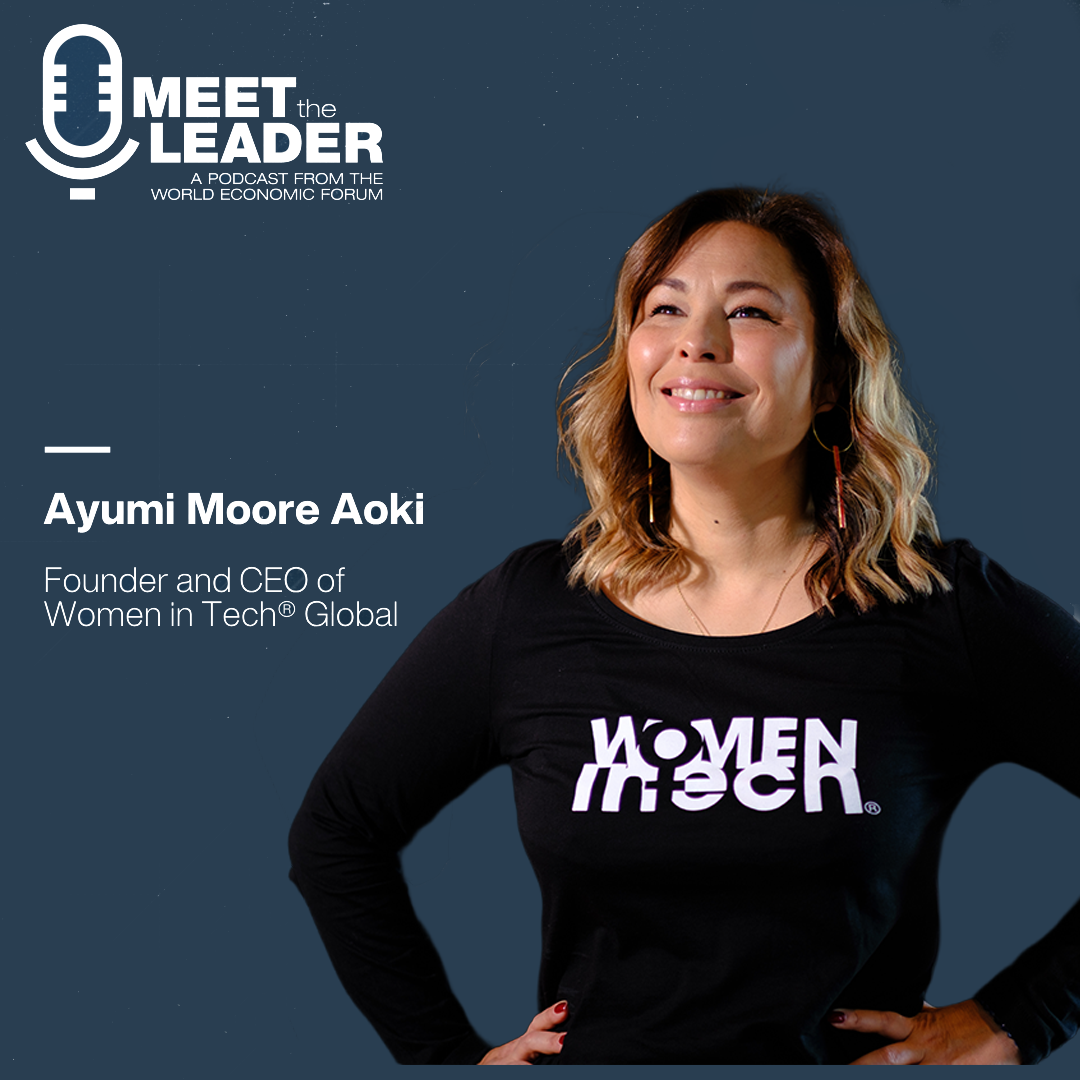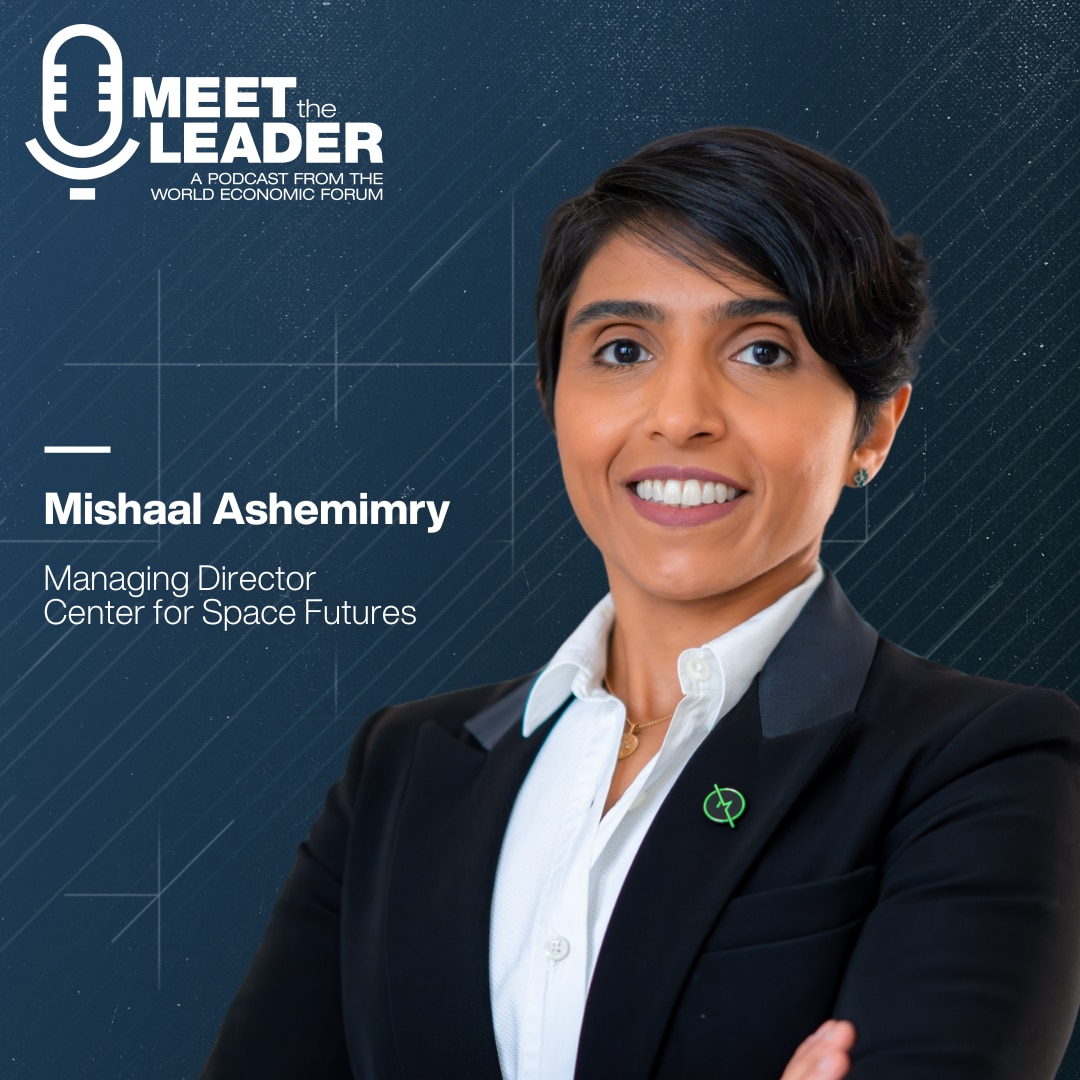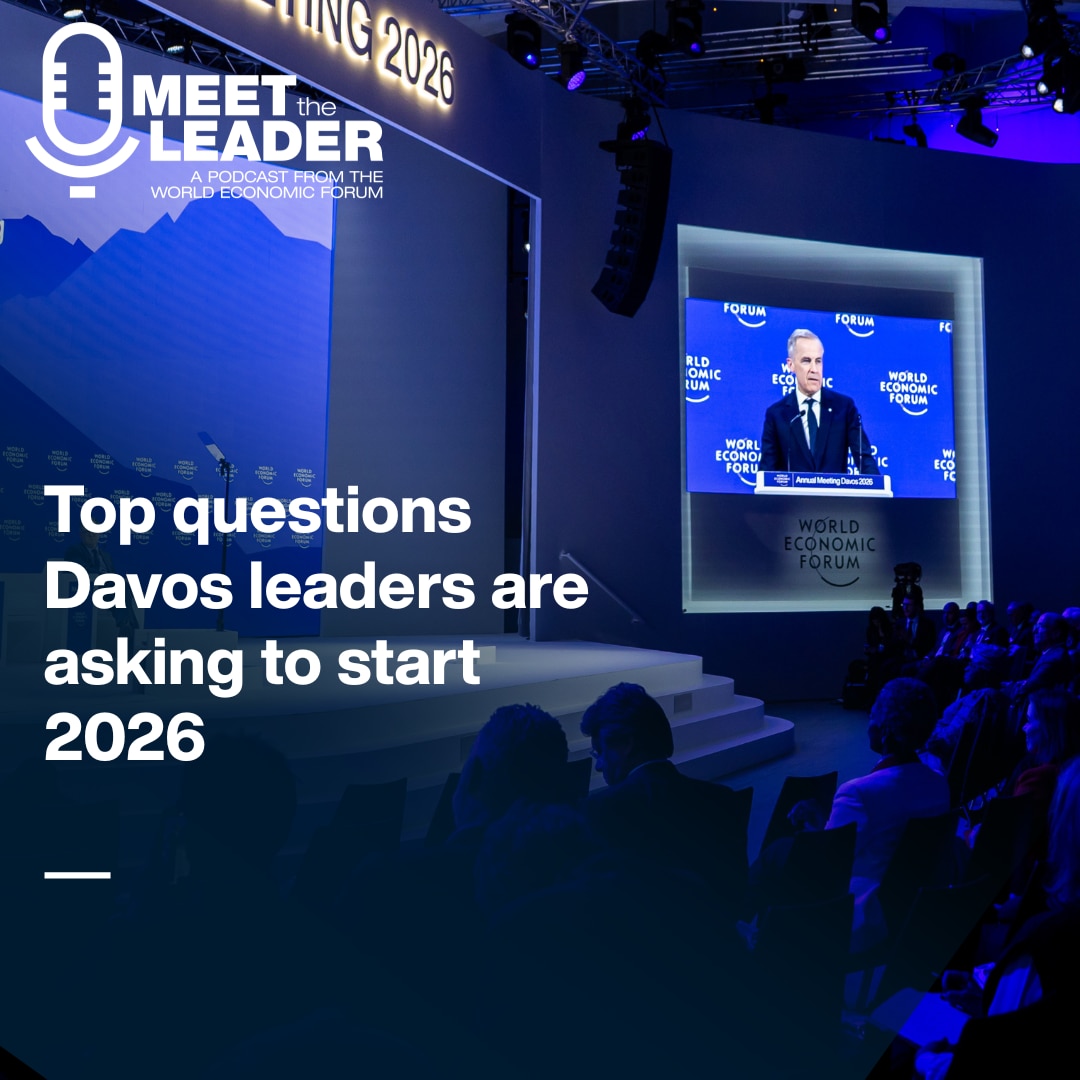This simple framework can drive disruptive innovation: Qualcomm's Cristiano Amon
ポッドキャスト・トランスクリプト
Cristiano Amon, Qualcomm: Having become a leader when a particular technology today is no guarantee that you're going to be a leader tomorrow.
Linda Lacina, Meet The Leader: Welcome to Meet the Leader, a podcast where top leaders share how they're tackling the world's toughest challenges. Today's leader, Cristiano Amon, the CEO of tech giant Qualcomm. He'll talk about the digital technologies that are poised to transform our lives.
Subscribe to meet the Leader on Apple, Spotify, and wherever you get your favourite podcasts. And please take a moment to rate and review us. I'm Linda Lacina from the World Economic Forum and this is Meet the Leader.
Cristiano Amon, Qualcomm: The cycle of innovation is now accelerated, and we don't have a choice. We have to reinvent ourselves all the time.
Linda Lacina, Meet The Leader: Cristiano Amon understands transformation. As the CEO of Tech multinational Qualcomm. His company has been a pioneer in everything from software to cellular connectivity.
He talked to me in Davos at the Annual Meeting about how new technologies will ensure a more intelligently connected world leveraging the cloud for changes in health care, retail, manufacturing and energy.
He shared how Qualcomm drives innovative thinking in its teams and the simple framework it uses to decide which disruptive ideas to take forward. He'll talk about all that and how he stays current on the latest and greatest. But first, he'll define for us what the digital transformation is and how it can change our lives.
Cristiano Amon, Qualcomm: We've been on this mission to make sure that everything is intelligently connected. I feel when you when you look at the possibility of making those devices intelligent, they have the ability to be connected with the cloud 100% of the time, you enable this digital transformation. And we see that has been very impactful pretty much every industry.
When you ask me, what does it mean? So, if you think about, for example, an industry like retail and you think what's the future of retail and especially a large retail? Well, every retailer we learned that the pandemic has now to implement e-commerce. You have to have e-commerce in a retail. You need a lot of technology to transform the business. How for example, you are monitoring the shelves in real time, how you manage your stock, where you have the activity, how you can sell online and have the ability for somebody to know how to pick up your order. So, there's a lot of technology. But then you go to health care. The ability to multiply health care with telehealth or with the ability to extend the hospital to different locations, all enabled by technology, just connectivity and digital. And you go to manufacturing, you go to energy and so forth.
So, I think digital transformation is happening at a very fast pace. He has proven to be very resilient. Regardless of the macroeconomics, people will see the role of technology for growth. They see the role of technology to become more efficient. And I think technology will continue to change people's lives.
Linda Lacina, Meet The Leader: Is there a particular innovation that you're really excited about?
Cristiano Amon, Qualcomm: As a company, there has been, you know, for every generation of wireless, I go back to the cellular part of Qualcomm and I think technology said there's 3G, 4G, 5G. This will put it on the map. We looked at every one of those technologies. They came in the mobile space to solve a problem. I think the role of 2G was can everybody in the world have a phone? The role of 3G is can your phone communicate with the Internet? The role of 4G was can your phone become a computer? And then I think when you think about the role of 5G, can you be connected to the cloud 100% of the time? And then everything else being connected.
And we saw to those transitions the evolution of device and how that shape what we think about what the predominant computing platform is. The computing platform used to be the personal computer now is defunct. So, what I'm excited about it is what is the next computing platform? And we've been working for probably more than a decade in fundamental research to make glasses, you know, the bridge between the physical world and the digital world. And I'm excited about what's actually happening with that. And I think you talk about it within the metaverse, but virtual reality, augmented reality, mixed reality. It's within the next 5 to 10 years, we expect that you're going to have a glass that's going to be component of your phone and eventually you're just going to have the glass. And I think that's a transformation of technology that we're very excited about.
Linda Lacina, Meet The Leader: And what would be different? What would you be able to possibly potentially, do with the glasses that maybe people could give them a little bit of a sense of taste of the future.
Cristiano Amon, Qualcomm: If you think about fully immersive augmented reality, right? You know, today era when, you know, you look at everybody looking at our phones, it can be limited by the screen. You know, you have access now to unlimited computing power from the cloud, artificial intelligence from the cloud in your device. And then if you have the ability to have glasses, you can see how this is going to change. I'll walk you to some future use cases.
First of all, when something as simple as talking to someone, having a phone call, we used to, you know, we'll talk on our phones like this and then all of a sudden, we're holding our phones and texting. That's in the 4G era. In the pandemic, we learned to hold the phone right in front of you for video telephony. Tomorrow with our glasses, I could just render you right in front of my eyes as holographic display in and a simple conversation is going to be like, you and I have this experience right now in real the same thing. You can walk into a place, and you can identify people immediately. Go to the cloud and see who are they, what are their what information is available for them on LinkedIn? Is it part of my contacts? All the way to things that you want to have Information. I think is going to be a new array of use cases. And many of those things we don't even know because they're yet to be invented.
Linda Lacina, Meet The Leader: How do you think it might even change the future of work?
Cristiano Amon, Qualcomm: Oh, dramatically. You know, especially we're starting to see right now some early applications of this technology when people are now working from home or collaborating, you're starting to see some activity. You see, you know, companies like Meta and Microsoft doing this. The ability not only for you to have multiple virtual screens that you can see, but also how you can collaborate in a meeting space with other people but more fully immersed. So that's one, you know, technology that is still in these early stages. But I think there's a lot of growth potential.
Linda Lacina, Meet The Leader: What could hold any of this back?
Cristiano Amon, Qualcomm: I think it's just time. I don't think I don't think the I think the road map for the technology, and I think the what's going to happen in the future is very clear. But like everything, you know, you need to scale, and you need time for technology to mature and get to the price points that you can actually, you know, do this now for a few thousands of people, but hundreds of millions of people or things. And I think we're going to see that within the next five years.
Linda Lacina, Meet The Leader: What is really, really key to making sure that your staff, the teams, that everyone, is thinking outside the box, pushing the envelope, but also still investing in things that, you know, having that balance, investing in things that are like good bets. How do you balance that while still sort of keeping people encouraged and challenged?
Cristiano Amon, Qualcomm: I think that speaks a little bit about our company culture. You know, the interesting thing about our company and the sector that we are in, the tech sector, it's we don't have a choice. We have to reinvent ourselves all the time. I you know, the technology that we have today, especially given the high speed of innovation. Like, for example, not only what we're doing in phones, what we're doing in cars, we're doing an industrial, you know, but the cycle of innovation is also now accelerated. You have new disruptive technology coming sometimes on annual basis and having to become, you know, a leader on a particular technology today is no guarantee that you're going to be a leader tomorrow.
And I think that requires an organisation that is used to be always reinventing themselves. The other aspect is, and that's another unique thing about Qualcomm. I think we're a very technical company. I think the ability to make both long term bets. Sometimes we have like this just this conversation we had on virtual reality. We have to invest on those things before they were popular or people know about it and the ability to take long term bets and invest in technology that is risky, but it has a lot of potential.
Linda Lacina, Meet The Leader: What are the factors to consider to make that determination that, you know, “hey, it's risky, but worth it?” Is there like the three top three ingredients that you would need to have for that?
Cristiano Amon, Qualcomm: I think the first one is can you solve a real problem? Is this a technology in in search of a solution or is actually a true solution? It can solve a real problem. You can have clarity of what the use case or what the use case potential is. I think that's one.
The second one is and that's, you know, sometimes companies that embark on innovation even go to other industries like we were in the process of diversifying ourselves, go into automotive, go into industrial, are going to be personal computing and entering the PC space. Companies used to make a very good assessment of what their core competencies are like. Do you have the core competencies required for the innovation? And if you don't, do you know how to get it? I think that's the second one. And I think the third one you need to have motivated teams to embark on that journey.
Linda Lacina, Meet The Leader: Is there maybe like a gut check somebody can have to make sure -- one of the things you've mentioned that you don't want to just because you're great today, does it mean that you're guaranteed. Your spot on the top is and guaranteed. And so, if somebody had an amazing technology that was a game changer, that was a leader and everyone was trying to kind of mimic and build on that. How can they make sure that they're not resting on their laurels? Is there a tell that maybe you're still thinking about winning yesterday's game?
Cristiano Amon, Qualcomm: You know, it's a good question. Maybe it's consistent to what I said before. I think the worst thing that can happen to companies to become complacent. Right? And I think you have to remember what got you into the position in the first place and how do you not lose that? You know, we're a relatively large company, but I often internally talk about it. We classify ourselves as the world's largest start-up company. And I think you have to keep that mentality. And also, it's part of the technology cycle. When you develop something is very successful, you build on this. I think part of the -- is to keep the curiosity, to say, what are we going to do next?
Linda Lacina, Meet The Leader: So, you have been at Qualcomm since 1995, is that correct? How have you changed as a leader in that time?
Cristiano Amon, Qualcomm: Over time, I had an opportunity to work in a number of different areas that Qualcomm. Had and been very privileged to be part of every single wireless transition since the days of analog cell phones and the ability to be part of some of those technology transformations. I guess I evolve with it, but I don't know if I can tell you that I really changed much. I think what is different when you become a leader, it's really less about what you can do and how you change for the job. But can you surround yourself with people that are going to be better at doing that than you can do yourself and give them the conditions to succeed. And I think if anything, that's what changes with leadership.
Linda Lacina, Meet The Leader: As leaders are evaluating their teams to make sure that they are giving them those conditions -- what should they be looking for? How can they sort of scan to make sure that they're giving them the environment they need?
Cristiano Amon, Qualcomm: You know, it's often a challenge in big company, especially when you're doing multiple things at once. I've always been a big believer of you empower teams. So, I think you make sure that they are -- of course, leaders want their teams to be accountable, accountable to results. But you also need to empower them and make sure that they are able to do the things that they need to succeed. In a company like Qualcomm, it's a very important part of our culture is we often talk about ‘One Qualcomm,’ Even though they're different teams, different businesses, different areas of research, can we collaborate and work as one so that we have the ability to tap on resources when we need them? And I think that one of the things that, you know, we do, and I have done with the teams. And I think the other one is it's okay to experiment and fail, learn from your failures and that's how we get better in how we do new and disruptive things.
Linda Lacina, Meet The Leader: Working in innovation. Is there something that you do to kind of to get new ideas or to be inspired or to kind of plug yourself into what's new and what's fresh?
Cristiano Amon, Qualcomm: One of the things that I personally do, and that's actually one of the reasons I'm here in Davos -- I spend a lot of time talking to other companies, to other executives for other companies. Many of our partners, especially now as we as a company, are expanding to so many different industries beyond mobile. I spend a lot of time trying to understand what are the problems we're trying to solve, and that help us as a company try to identify what is the technology solution to that. And I think that has been extremely helpful, especially as we go into deep into automotive, deep into the industrial part of IoT to actually understand from our customers what are the end goals. And that has given us great input for the innovation cycle.
Linda Lacina, Meet The Leader: Is there a piece of advice that you've always been grateful for?
Cristiano Amon, Qualcomm: I often ask this question also internally. I think there's two things that have been extremely useful for me: To spend time understanding what are the things that I can do well, what are the things that I cannot do well. And then make sure I, I surround myself with people that are going to be able to do the things I don't do well, way better than I'll be able to do it.
The second thing is, it's incredibly powerful, I think the power of people. So, I always overcommunicate. You know, I do things like every year we have the whole strategy on a page that we distribute to every single employee in the company, regardless of what area they work on. And I think the power of aligned people on a mission, there's a lot of smart people. What the collective, what the smart people can do to build on the strategy, it's way more powerful than one person doing it.
Linda Lacina, Meet The Leader: One of the themes of the last few years has been resilience. What do you think is the role of public leadership at a time like now where there's multiple crises? As we know, the Global Risk Report said there's a policy crisis going on, energy and climate. What is the role of public leadership right now?
Cristiano Amon, Qualcomm: I'll probably give you an answer which is maybe somewhat related to our sector. But I think now more than ever, I think the importance of public and private partnership are paramount. And especially when you think about how technology can solve many of those challenges, whether it's energy and sustainability, whether it's enabling us to continue to have a global interconnected economy. I think the words are really collaboration and partnership.
Linda Lacina, Meet The Leader: What should leaders be prioritising this next year?
Cristiano Amon, Qualcomm: I think it's been a topic of conversation, as always, the importance of more efficient and affordable energy. But they're also maybe a little bit bias from our side. We think that there's an incredible future for the digital economy. The economy will have a big digital component. But for that to happen, you need to have critical infrastructure, roads and ports and railroads and the electrical grid. I think the communication networks, the 5G and the fibre networks are going to be extremely important for this digital economy. That's going to be the backbone of digital. So, I think governments should always prioritise the ability to have their critical digital infrastructure to build their economy up.
Linda Lacina, Meet The Leader: And is there a certain hallmark of excellence in public leadership?
Cristiano Amon, Qualcomm: I applaud a lot of the initiatives across many regions, many countries, to basically incentivise the application of technology, including the public sector, to basically make it easier for companies to do business to create a start-up community. And I think more important than I think, their willingness to partner broadly with the private sector.
Linda Lacina, Meet The Leader: That was Cristiano Amon. Thanks so much to Cristiano and thanks so much to you for listening. A transcript of this episode and my colleagues’ episodes -- Radio Davos and the Book Club Podcast -- is available at wef.ch/Podcasts.
If you like this episode, check out episode 50 with Phillips's Innovation Chief, Shez Partovi. This former physician turned health tech innovator, shares what his early career taught him about tackling tough problems. He also takes us through the questions that you should ask yourself to ensure you are truly innovating.
This episode of Meet the Leader was presented and produced by me with Juan Toran as studio engineer and Gareth Nolan driving studio production.
That's it for now. I'm Linda Lacina with the World Economic Forum. Have a great day.
Qualcomm has long served as a tech pioneer, driving innovations in cellular connectivity, AI, autonomous driving and more. CEO Cristiano Amon shares how digitalization will further transform our lives -- from health and retail to energy and the future of work. He also shares how Qualcomm drives innovative thinking in its teams and the simple framework any leader can use to decide which disruptive ideas to take forward. Scroll for transcript.
その他のエピソード:
「フォーラム・ストーリー」ニュースレター ウィークリー
世界の課題を読み解くインサイトと分析を、毎週配信。










